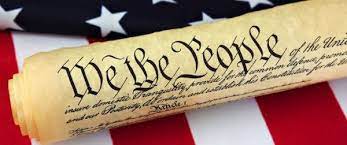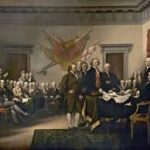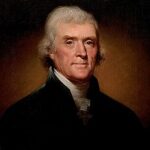The principles of the United States are established by its three founding documents created by the Founding Fathers. These documents are the Declaration of Independence, the United States Constitution, and the Bill of Rights. The documents were put together by men who had a vision for their nation. Yet, many do not know the significance of each and how important they are today.
Many people are unaware of what the United States Constitution actually says, for example. I had to memorize parts of it in school, but I didn’t know what much of it meant until I was older. The Constitution is the foundation of our nation’s government, created to ensure our freedoms and rights. The significance of the Constitution and these other documents may show why many have given everything to follow it.
I am married to a historian who has taught history for decades. I didn’t know half of what I wish I knew when I took history in school, and I have learned so much from him. He has helped many students (me included) look at history from a different lens. He teaches how to see the patterns and connect the dots. With his help, I have gotten much better at seeing how history repeats itself.
The Declaration of Independence
The Declaration of Independence was a document that announced the colonies’ wish to be independent from Britain. It was adopted on July 4, 1776. The colonists justified their decision to separate from British rule by outlining all the grievances against King George III, proclaiming the importance of the rights to individuals, such as life, liberty, and the pursuit of happiness.
The Articles of Confederation were our Nation’s First Constitution
Before the United States Constitution, the Articles of Confederation were what governed the nation. Created during the American Revolution, they were adopted by the Continental Congress in 1777. By 1781 all thirteen states ratified them. The colonies needed a unified government to help with war efforts against Britain and to manage other foreign relations. After fighting a war for their independence, the colonists wanted to create sovereignty and independence for each state, avoiding the creation of a government like the authority they had under Britain. While this central authority was necessary to manage economic and defense needs, they still wanted the support of each other during and after the war. The Articles put in place limited powers of this central government (mostly related to foreign policies, military matters, and resolutions of disputes between states), so a national government couldn’t interfere with the internal affairs of the states.
The Articles of Confederation were not perfect. Although they were fundamental in the development of our new nation, there were no executive or judicial branches. This lack of authority was necessary to regulate commerce, yet it resulted in issues that couldn’t be effectively handled. Interstate disputes over trade, borders, and other issues made it nearly impossible to adapt to changing needs without a strong central government. Therefore, any amendments made to these Articles were required to have unanimous consent between states. This caused more challenges.
The Transition to the Constitution: A Pillar of Freedom
In 1787, the Constitutional Convention met in Philadelphia to address these issues in the new nation. This resulted in the drafting of the United States Constitution. It was eventually ratified on June 21, 1788, becoming the land’s law. The Constitution established three government branches. These were legislative (creates the laws), executive (enforces the laws), and judicial (interprets the laws as Constitutional). The branches were established so that one branch was prevented from being too powerful over the others. Furthermore, the creation of a stronger central government also respected state sovereignty.
The Bill of Rights
The first ten amendments of the Constitution are known as the Bill of Rights, ratified on December 15, 1791. These rights guaranteed specific individual freedoms like speech, religion, and the press. They were specifically put in place for citizens to live without government interference. Citizens should not have to live in a fearful and/or unjust nation. The Fathers thereby wanted to limit the power of the federal government over its citizens. The right to bear arms (Second Amendment) is essential to protect us from the potential abuse of government power. We needed weapons to protect ourselves from the government. Fair searches and seizures, fair jury trials, and no cruel and unusual punishments protect us in other amendments. The last amendments allow states and people to have certain powers over the federal government.
Who Were the Founding Fathers?
We’ve all heard about George Washington, John Adams, Ben Franklin, Alexander Hamilton, James Madison, and Thomas Jefferson. These men were the key figures who were revolutionary in the roles of the forming of the United States. Not only were they part of the American Revolution which led to the nation’s freedom, but they are also known as our Founding Fathers who helped in the birth of our nation. Their actions and choices are pivotal in our celebrating the 4th of July in the first place.
- George Washington: Often called the “Father of His Country,” his leadership and vision were often called upon. Not only was he the first President of the United States, but he was also the commander-in-chief of the Continental Army.
- John Adams: Serving as the second President of the United States, he helped draft the Declaration of Independence to the King, playing a key role in our independence.
- Benjamin Franklin: He was not only a key diplomat while securing French support during the Revolution but he is also known for his wit and wisdom.
- Alexander Hamilton: He established a national banking system, as the first Secretary of the Treasury, promoting a strong federal government. He and Jefferson often disagreed on this, and he and Jefferson were the reason the original political parties started in the first place.
- James Madison: His ideas and leadership were necessary in drafting the Constitution and the Bill of Rights. He was the protege of Thomas Jefferson and communicated with him constantly in his absence of the Constitution drafting.
The Significance of Thomas Jefferson
Thomas Jefferson was influential in shaping the early United States government. He wasn’t directly involved with drafting the Constitution, but his ideas and philosophies were impactful in the creation of the document. He communicated with the delegates as it was created, especially with James Madison, while Jefferson was acting as the U.S. Minister to France during the Constitutional Convention. He continued his advocacy for individual rights and limited government influences, making sure the document protected those personal freedoms.
Thomas Jefferson believed slavery was morally wrong and harmful to all involved, despite his ownership of slaves. He included a passage against the slave trade in the original draft of the Declaration of Independence, but it was removed. Some were fearful that an immediate abolition of slavery would lead to the collapse of an already divided nation. Ironically, Ben Franklin, head of the American Anti-Slave Society believed the country needed to be united and strong in defeating Britain before taking a stand on tackling an issue as large as slavery.
Not only was Jefferson an avid book lover, and his love of knowledge led to the founding of the Library of Congress. After the War of 1812, Jefferson sold his own personal library to the government, helping to rebuild the library, after the British had burned it down during the Second American Revolution; the War of 1812.
The Risks Our Founding Fathers Faced
Think about the risks involved to these great men. They were away from their families, up against a tyrannical government, trying to preserve the rights given to us at birth. They were well-educated, spiritual, and dedicated to preserving their God-given rights. Unfortunately, they were up against a government that didn’t have these rights in mind, they were more interested in power for themselves.
Our Founding Fathers and others pledged their lives, fortunes, and sacred honor to the great cause of independence. When they signed it, they knew they had to succeed, otherwise they would have been executed by their government. As Independence Day is celebrated, we should remember the significance of the United States Constitution. These leaders were willing to sacrifice their lives for a cause greater than themselves. They knew their dedication to liberty, justice, and equality would set an example and would continue to guide us even today.
If you like history, you’ll love what this teacher has to say. Join his class, and you’ll be blown away by the historical patterns he’ll show you. Educate yourself or others with this amazing online homeschool, brought to you in the comfort of your home by talented teachers such as this one.
As always, I am here to answer questions or help you find and learn some amazing things. Thanks for visiting! Don’t forget to reach out and contact us for even more information. Once you are added to our Online Community, you’ll benefit in more ways than you think! Contact us HERE!



